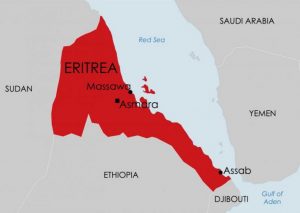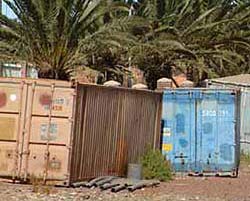 In mid-March, twenty-nine evangelical Christians were arrested when Eritrean security forces raided a prayer meeting in a house in the capital, Asmara. It is understood that seventeen women and twelve men were arrested and then taken to Mai Serwa prison camp located on the outskirts of Asmara.
In mid-March, twenty-nine evangelical Christians were arrested when Eritrean security forces raided a prayer meeting in a house in the capital, Asmara. It is understood that seventeen women and twelve men were arrested and then taken to Mai Serwa prison camp located on the outskirts of Asmara.
Most evangelical Christian gatherings have been held in private homes for the past twenty years since the Eritrean government closed all churches apart from Eritrean Orthodox, Roman Catholic and Lutheran.
While it is not known what prompted the security forces’ raid, every residential area in Eritrea is known to have a government spy living there who observes what is going on in the neighbourhood and reports any unusual activity to the authorities. Many churches have found that government spies, pretending to be Christians, have joined and reported on church members.
The recently-arrested Christians, like the vast majority of prisoners in Eritrea, have not been formally charged or brought to court and do not know when, or if, their detention will end. In similar previous cases, Christians have been held for a couple of weeks before being freed, but in other cases they have been held for longer periods.
Prison conditions
Mai Serwa is a large, sprawling complex housing far more prisoners than its limited facilities were built to accommodate. Conditions at the complex and other Eritrean prisons were condemned by Amnesty International in 2020: “With overcrowding and general lack of adequate sanitation, healthcare and food, conditions in these detention facilities are inhumane and a cause of major concern in the face of COVID-19. No one should be held in conditions that can have disastrous consequences on their mental and physical health.
“Detainees are rarely allowed to bathe or wash their clothes. Shoes and slippers are strictly prohibited to prevent detainees from jumping over barbed wire fencing. Authorities do not provide personal hygiene products like soap, so detainees rely on their families for supplies.
 “Prisoners are held in shipping containers in the complex holding more than 20 detainees, and in halls measuring up to 10x20m. Often, prisoners take turns to sleep on bare floors because beds or mattresses are not allowed.”
“Prisoners are held in shipping containers in the complex holding more than 20 detainees, and in halls measuring up to 10x20m. Often, prisoners take turns to sleep on bare floors because beds or mattresses are not allowed.”
Release Eritrea, a Church in Chains partner organisation, states that the number of known Christian prisoners has increased to around 200 in recent months. The number had fallen to a low of approximately 130 in summer 2021 after a period during which many Christians were released.
General living conditions in Eritrea
Release Eritrea reports that Eritrea is going through its worst time in the history of the country. President Isaias Afewerki’s government is devoting huge resources to fighting the war in Tigray province in northern Ethiopia. An estimated 80% of Eritrea’s army is understood to be fighting alongside Ethiopian troops against the Tigray People’s Liberation Front in a war recently described by Dr Tedros Adhanom Ghebreyesus, director general of the World Health Organisation (who is from Tigray), in stark terms: “There is nowhere on earth where the health of millions of people is more under threat than in Tigray. Just as we continue to call on Russia to make peace in Ukraine, so we continue to call on Ethiopia and Eritrea to end the blockade, the siege, and allow safe access for humanitarian supplies and workers to save lives.” The UN has been unable to get emergency food supplies into Tigray since mid-December.
The diversion of huge amounts of Eritrean government funding to the war in Tigray means that there is a lack of food and medicine in Eritrea itself together with a noticeable rise in poverty and homelessness in Asmara.
Release Eritrea states that the church is really struggling as church members have no money for tithes and offerings to support pastors. Recently one pastor, whose bank account was frozen in Eritrea, was forced to leave the country because of the economic situation.
(Release Eritrea, Amnesty International, Guardian)
